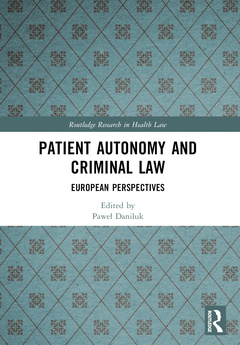Patient Autonomy and Criminal Law European Perspectives Routledge Research in Health Law Series
Coordonnateur : Daniluk Paweł

List of Contributors
Introduction
Paweł Daniluk
Chapter 1. Patient Autonomy and Criminal Law: An Austrian Perspective
Joanna Długosz-Jóźwiak
Chapter 2. Patient Autonomy and Criminal Law: A Belgian Perspective
Frank Verbruggen
Chapter 3. Patient Autonomy and Criminal Law: A Bosnian-Herzegovinian Perspective
Maja Pilić
Chapter 4. Patient Autonomy and Criminal Law: A Bulgarian Perspective
Darina Zinovieva & Daniela Doncheva
Chapter 5. Patient Autonomy and Criminal Law: A Czech Perspective
Olga Sovova & Helena Van Beersel Krejčíková
Chapter 6. Patient Autonomy and Criminal Law: A Finnish Perspective
Raimo Lahti
Chapter 7. Patient Autonomy and Criminal Law: A German Perspective
Dorothea Magnus
Chapter 8. Patient Autonomy and Criminal Law: A Greek Perspective
Elisabeth Symeonidou–Kastanidou
Chapter 9. Patient Autonomy and Criminal Law: An Italian Perspective
Riccardo Ercole Omodei
Chapter 10. Patient Autonomy and Criminal Law: A Latvian Perspective
Aldis Lieljuksis
Chapter 11. Patient Autonomy and Criminal Law: A Lithuanian Perspective
Gintaras Švedas & Aurelijus Gutauskas
Chapter 12. Patient Autonomy and Criminal Law: A Montenegrin Perspective
Darko Radulović
Chapter 13. Patient Autonomy and Criminal Law: A Dutch Perspective
Liselotte Postma
Chapter 14. Patient Autonomy and Criminal Law: A Norwegian Perspective
Linda Gröning
Chapter 15. Patient Autonomy and Criminal Law: A Polish Perspective
Paweł Daniluk
Chapter 16. Patient Autonomy and Criminal Law: A Portuguese Perspective
Sónia Fidalgo
Chapter 17. Patient Autonomy and Criminal Law: A Russian Perspective
Alexander Georgievich Blinov
Chapter 18. Patient Autonomy and Criminal Law: A Serbian Perspective
Veljko Turanjanin
Chapter 19. Patient Autonomy and Criminal Law: A Slovenian Perspective
Damjan Korošec
Chapter 20. Patient Autonomy and Criminal Law: A Spanish Perspective
Manuel Cancio Meliá
Chapter 21. Patient Autonomy and Criminal Law: A Swiss Perspective
Nora Scheidegger
Chapter 22. Patient Autonomy and Criminal Law: A Turkish Perspective
Hakan Hakeri
Conclusion: A Comparative Look at the Criminal Law Protection of Patient Autonomy in Europe
Krzysztof Wala
Index
Paweł Daniluk is a Professor in the Institute of Law Studies of the Polish Academy of Sciences.
Date de parution : 05-2024
17.4x24.6 cm
Date de parution : 10-2022
17.4x24.6 cm
Thèmes de Patient Autonomy and Criminal Law :
Mots-clés :
criminal law; medical law; patient autonomy; consent for a medical procedure; informed consent; medical procedures without consent; Patient's Consent; Presumed Consent; Criminal Law Protection; Criminal Liability; Medical Treatment; Minor Patient; Compulsory Treatment; Criminal Code; Compulsory Vaccination; Medical Legislation; Medical Activities; Medical Measures; Healthcare Professionals; Criminal Offence; Violated; Medical Practitioners; Corpus Delicti; Health Personnel; DNR Order; Compulsory Psychiatric Treatment; Dutch Criminal Code; Suicide Assistance; Substitute Consent
